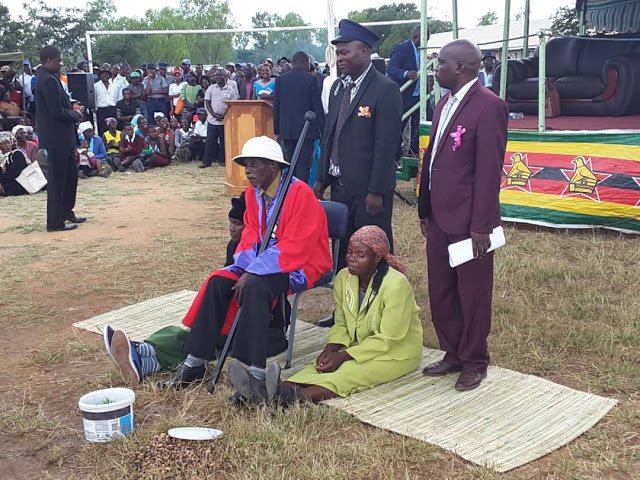 |
| Phenius Tafirei was installed as the inaugural leader of the revived Bere chieftainship in April 2019 |
Tendai Mafuka
There
is a bitter tiff between traditional leaders Chief Bere and Chief Zimuto for control
of the resettlement areas in Summerton and this has put villagers, particularly
women, in a very difficult situation as they have to make very difficult
choices, TellZim News can report.
The
chisi traditional day of rest, for instance, falls on different days in the two
chieftaincies and this has seen some women being given a hard time for working the
fields on the wrong days.
The
Zimuto chieftaincy’s chisi is observed on Wednesdays while the Beres observe it
on Thursdays, a reality which means that villagers lose three working days per
week when one considers that Saturdays or Sundays are days of worship for Christians.
Some
women in the area say the tussle for control of Summerton by the two chiefs is
particularly bad for them because they more often need to be on the fields to
look for natural vegetables that help sustain many rural village families in
the rainy season as this.
Summerton,
which is in Masvingo North Ward 6, has traditionally been under Chief Zimuto
until the Bere chieftainship was revived early 2019.
As a
result of the tussle, members of the Summerton community are now divided with
regards to traditional authority allegiances, and they are caught between the whims
of the two chiefs.
The
revival of the Bere chieftainship created animosity with Chief Zimuto as the
Summerton area was reapportioned to the former but it was never made official.
Lucia
Tinarwo, a resident, said there was confusion and division in the area which
has seen some people falling afoul of contradictory customs of the two chieftaincies.
She
said the more daring were now ignoring the chisi custom altogether, while many
others who are more fearful were losing more days of work per week.
“On
a particular Wednesday, I was approached by Chief Zimuto’s people as I worked in
the fields. I had to beg for forgiveness because they wanted to seize the
wheelbarrow that I was using and take me to the traditional court. It was a
terrifying experience,” she said.
Another
woman who preferred to remain anonymous said it was now difficult to even get onto
the fields and gather such naturally-growing vegetables like nyevhe, mowa,
mushamba and muchacha on Wednesdays and Thursdays.
“The
two chiefs’ people are now victimising people who get to the fields even for
the simple purposes of getting vegetables. Each of the two sides is too eager
to enforce its own interests to the point of violating people’s rights and
making our lives more difficult,” said the woman.
When
contacted for comment, Masvingo District Development Coordinator (DDC) Ray Hove
said the resettlement area was officially under neither of the two chiefs
because a process called ‘emplacement’ was not yet done.
“Officially,
the area is not under any one of them because the emplacement process to
demarcate the boundaries between the two chiefs is not yet done. We have told
them not to exert their authority over the people and we will engage them to
reiterate that.
The
emplacement programme is on the cards and I am sure that it will be done soon
to stop the confusion that is happening there,” said Hove.
He
said people should continue operating in the way they were doing before until
the emplacement process gets done.
The
Bere chieftainship was revived after being dormant for several decades
following its suppression by colonial authorities in the early years of
European settlement in the country.
